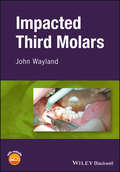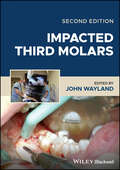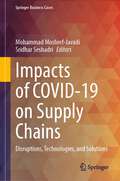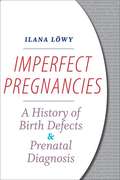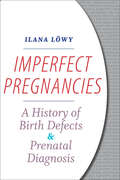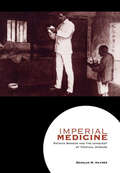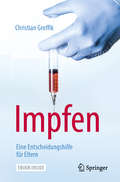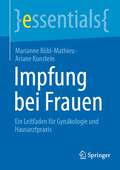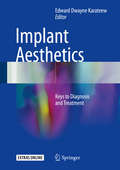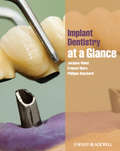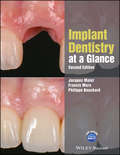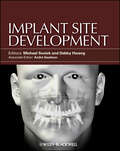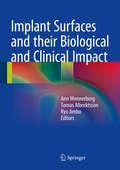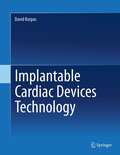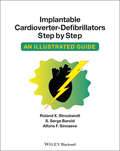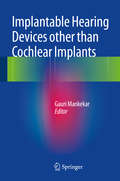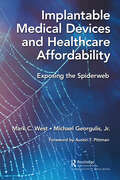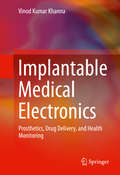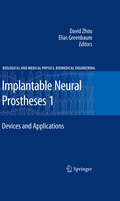- Table View
- List View
Impacted Third Molars
by John WaylandOffers clinically focused instruction for successful and safe removal of impacted third molars This book offers a comprehensive surgical guide for the successful removal of impacted third molars. It walks readers through basic anatomy, case selection, complications, pharmacology, and anesthesia, and covers surgical principles and techniques in detail with illustrations and photos. Instruments and postoperative care are also described, and a unique chapter discusses the author's mobile third molar practice. Impacted Third Molars covers everything that dentists need to know to safely remove impacted third molars with efficiency and confidence. Provides step-by-step procedures for removing impacted third molars Includes practice management, legal, and marketing advice Features procedural videos on a companion website Impacted Third Molars is an ideal reference for the general dentist, specialist, or resident.
Impacted Third Molars
by John WaylandIMPACTED THIRD MOLARS Gain confidence in third molar extractions, with advice relevant to general, specialty, and mobile third molar practice dentists Impacted Third Molars, Second Edition, provides dentists with all the information they need to confidently remove impacted third molars, from case selection and imaging to sedation and patient management. Step-by-step surgical procedures support dentists in the successful surgical removal of third molars. The second edition has been updated throughout with new information and advances, and seven new chapters cover local anesthesia, imaging, patient management, platelet rich fibrin, case studies, and mobile third molar practices. The book includes all the information dentists need to efficiently, profitably, and safely remove impacted third molars. Photographs and illustrations depict the concepts described, and a companion website offers video clips. Impacted Third Molars: Gives dentists all the information they need to consider mobile third molar practice, which provides more freedom, less stress, less overhead, and more profitability Helps dentists stop referring third molars and remove them early in the teen years before roots develop Features the author’s seven-step procedure for removing impacted third molars Includes a chapter describing the author’s mobile third molar practice, with a procedure manual Offers procedural videos on a companion website Impacted Third Molars, Second Edition is an essential reference for general dentists and specialists alike.
Impacts of COVID-19 on Supply Chains: Disruptions, Technologies, and Solutions (Springer Business Cases)
by Sridhar Seshadri Mohammad Moshref-JavadiThis book examines the effects of the pandemic on supply chains and consequent adjustments made by companies to cope with these effects. This research sheds light on the challenges faced by diverse industries during the COVID and post-COVID periods and the solutions employed by companies to tackle them. The book covers several strategies, such as fulfillment strategies, inventory management, insourcing/outsourcing decisions, agile operations adaptation, capacity management, supplier management, forecasting, and business analytics undertaken by firms and institutions to quickly adapt their supply chains to manage risks and operations during the pandemic. Through numerous cases studies, it explores the roles and impacts of new algorithms and technologies, such as digitization, blockchain, artificial intelligence, and machine learning methods, in risk mitigation and management in healthcare, logistics, manufacturing, automotive, food and beverage, and retail industries during and after the COVID-19 pandemic. Written by professionals and academics, it presents invaluable insights gained from managing disruptions during and after the COVID-19 pandemic and identifies the factors for companies and industries to consider in making their supply chains resilient to similar disruptions. This invaluable resource particularly caters to researchers in academia or industry, practitioners, and graduate students alike.
Impacts of Climate Change on Allergens and Allergic Diseases
by Paul J. BeggsClimate change has been identified as the biggest global health threat of the twenty-first century. Hundreds of millions of people around the world currently suffer from allergic diseases such as asthma and allergic rhinitis (hay fever), and the prevalence of these diseases is increasing. This book is the first authoritative and comprehensive assessment of the many impacts of climate change on allergens, such as pollen and mould spores, and allergic diseases. The international authorship team of leaders in this field explore the topic to a breadth and depth far beyond any previous work. This book will be of value to anyone with an interest in climate change, environmental allergens, and related allergic diseases. It is written at a level that is accessible for those working in related physical, biological, and health and medical sciences, including researchers, academics, clinicians, and advanced students.
Impacts of Rationing and Missed Nursing Care: RANCARE Action
by Riitta Suhonen Evridiki PapastavrouThis book reveals how economic restrictions and limited healthcare resources, combined with growing care demands due to advanced technology and more care options, have to a great extent contributed to increased workloads for healthcare professionals and put them under pressure to prioritize their work. This has led to the rationing of care, i.e., to decision-making processes on the allocation of scarce resources, especially human resources, and on which care activities take priority over others; in turn, these processes have led to unfinished or missed care, which has serious implications for quality of care and patient safety. Concerns related to nursing shortages and lean staffing practices have increased the awareness of the problem, as patient outcomes are affected by the quality and quantity of care that they receive and led to intensified scientific inquiry into this phenomenon. This book is written by the members of the Rancare Cost Action group, whose aim is to facilitate discussion about rationing of nursing care based on a cross-national comparative approach with implications for practice and professional development. Four working groups investigated four areas for four years: a) the conceptualization of care rationing and methodological inquiries concerning the investigation of the phenomenon, b) exploration of possible solutions and intervention studies, c) the ethical perspective of care rationing and missed care including patients’ rights and possible discrimination, and d) the educational implications, based on an exploration of the level of patient safety training and care rationing, as well as preparing guidelines for managers. The book will be a valuable resource for nurses, allied healthcare professionals, managers, policymakers, researchers, ethical committees, and educators whose goal is to provide better and safer care.
Imperfect Pregnancies: A History of Birth Defects and Prenatal Diagnosis
by Ilana Löwy<p>In the 1960s, thanks to the development of prenatal diagnosis, medicine found a new object of study: the living fetus. At first, prenatal testing was proposed only to women at a high risk of giving birth to an impaired child. But in the following decades, such testing has become routine. <p>In Imperfect Pregnancies, Ilana Löwy argues that the generalization of prenatal diagnosis has radically changed the experience of pregnancy for tens of millions of women worldwide. Although most women are reassured that their future child is developing well, others face a stressful period of waiting for results, uncertain prognosis, and difficult decisions. Löwy follows the rise of biomedical technologies that made prenatal diagnosis possible and investigates the institutional, sociocultural, economic, legal, and political consequences of their widespread diffusion. <p>Because prenatal diagnosis is linked to the contentious issue of selective termination of pregnancy for a fetal anomaly, debates on this topic have largely centered on the rejection of human imperfection and the notion that we are now perched on a slippery slope that will lead to new eugenics. Imperfect Pregnancies tells a more complicated story, emphasizing that there is no single standardized way to scrutinize the fetus, but there are a great number of historically conditioned and situated approaches. This book will interest students, scholars, health professionals, administrators, and activists interested in issues surrounding new medical technologies, screening, risk management, pregnancy, disability, and the history and social politics of women’s bodies.</p>
Imperfect Pregnancies: A History of Birth Defects and Prenatal Diagnosis
by Ilana LöwyHow has prenatal testing, once offered only for high-risk pregnancies, become standard medical care for pregnant women today?In the 1960s, thanks to the development of prenatal diagnosis, medicine found a new object of study: the living fetus. At first, prenatal testing was proposed only to women at a high risk of giving birth to an impaired child. But in the following decades, such testing has become routine. In Imperfect Pregnancies, Ilana Löwy argues that the generalization of prenatal diagnosis has radically changed the experience of pregnancy for tens of millions of women worldwide. Although most women are reassured that their future child is developing well, others face a stressful period of waiting for results, uncertain prognosis, and difficult decisions. Löwy follows the rise of biomedical technologies that made prenatal diagnosis possible and investigates the institutional, sociocultural, economic, legal, and political consequences of their widespread diffusion. Because prenatal diagnosis is linked to the contentious issue of selective termination of pregnancy for a fetal anomaly, debates on this topic have largely centered on the rejection of human imperfection and the notion that we are now perched on a slippery slope that will lead to new eugenics. Imperfect Pregnancies tells a more complicated story, emphasizing that there is no single standardized way to scrutinize the fetus, but there are a great number of historically conditioned and situated approaches. This book will interest students, scholars, health professionals, administrators, and activists interested in issues surrounding new medical technologies, screening, risk management, pregnancy, disability, and the history and social politics of women’s bodies.
Imperial Medicine
by Douglas M. HaynesIn 1866 Patrick Manson, a young Scottish doctor fresh from medical school, left London to launch his career in China as a port surgeon for the Imperial Chinese Customs Service. For the next two decades, he served in this outpost of British power in the Far East, and extended the frontiers of British medicine. In 1899, at the twilight of his career and as the British Empire approached its zenith, he founded the London School of Tropical Medicine. For these contributions Manson would later be called the "father of British tropical medicine."In Imperial Medicine: Patrick Manson and the Conquest of Tropical Disease Douglas M. Haynes uses Manson's career to explore the role of British imperialism in the making of Victorian medicine and science. He challenges the categories of "home" and "empire" that have long informed accounts of British medicine and science, revealing a vastly more dynamic, dialectical relationship between the imperial metropole and periphery than has previously been recognized. Manson's decision to launch his career in China was no accident; the empire provided a critical source of career opportunities for a chronically overcrowded profession in Britain. And Manson used the London media's interest in the empire to advance his scientific agenda, including the discovery of the transmission of malaria in 1898, which he portrayed as British science.The empire not only created a demand for practitioners but also enhanced the presence of British medicine throughout the world. Haynes documents how the empire subsidized research science at the London School of Tropical Medicine and elsewhere in Britain in the early twentieth century. By illuminating the historical enmeshment of Victorian medicine and science in Britain's imperial project, Imperial Medicine identifies the present-day privileged distribution of specialist knowledge about disease with the lingering consequences of European imperialism.
Impfen. Eine Entscheidungshilfe für Eltern
by Christian GroffikSie suchen einen Rat zum Thema Impfen?Dieses Buch des erfahrenen Kinderarztes und praktizierenden Impfarztes Dr. med. Christian Groffik liefert umfassende und klar verständliche Informationen zum Thema Impfen. Aus seiner langjährigen Beratungstätigkeit kennt er die vielfältigen Fragen von Eltern, wenn es um Impfungen und Impfstoffe geht – einschließlich der zunehmenden Bedenken, Vorbehalte und Ängste, die Berichte von Nebenwirkungen und anderen Problemen bei Impfungen bei manchen Eltern auslösen. In diesem Buch werden die häufigsten Fragen zum Thema Impfen explizit und fundiert beantwortet. Es liefert Ihnen einen ausgewogenen Blick und das Grundwissen, um eine fundierte Entscheidung beim Impfen zu ermöglichen.
Impfung bei Frauen: Ein Leitfaden für Gynäkologie und Hausarztpraxis (essentials)
by Marianne Röbl-Mathieu Ariane KunsteinAufgrund von Besonderheiten des Immunsystems weisen sowohl Schwangere, Ungeborene und Neugeborene als auch ältere Frauen eine erhöhte infektionsbedingte Morbidität und Mortalität auf, die durch Impfungen reduziert werden kann.Das essential vermittelt ärztlich Tätigen die wichtigsten immunologischen Grundlagen und konkrete Praxistipps, um Frauen und Mädchen in den unterschiedlichen Lebensphasen sachgerechte Impfempfehlungen zu geben, sie fundiert zu Impffragen zu beraten und Impfungen sicher anzuwenden. Der Leitfaden basiert auf den aktuellen STIKO-Empfehlungen.
Implant Aesthetics: Keys to Diagnosis and Treatment
by Edward Dwayne KarateewThis book, written by acknowledged experts with international reputations, provides clinicians with detailed guidelines on the nature of the ideal anterior dental implant and, more importantly, how the desired aesthetic outcome is to be achieved. It reflects the incredible paradigm shift that has taken place within implant dentistry during the past 5 years, with recognition of the importance of a 'crown down' approach to diagnosis, planning, and treatment, especially in the anterior zone. In order to ensure reproducibility and predictability of treatment outcomes, the fabrication of an aesthetic dental implant must follow a complex algorithm, which is reviewed in a stepwise approach. Sections are devoted to evaluation of the aesthetic implant patient, immediate implant placement, staged implant placement, and restoration. Readers will come to appreciate how the final emergence profile of the definitive restoration reflects the complex interplay of components below the visible smile zone. Helpful flow charts are included that will assist in optimal performance of the described procedures.
Implant Dentistry at a Glance (At a Glance #60)
by Jacques Malet Philippe Bouchard Francis MoraThis title in the highly popular at a Glance series provides a concise and accessible introduction and revision aid, comprehensively covering all the constituent sub-topics that comprise implant dentistry. Following the familiar, easy-to-use at a Glance format, each topic is presented as a double-page spread with facts accompanied by clear diagrams and clinical photographs encapsulating essential information. Implant Dentistry at a Glance is an ideal companion for all students of dentistry, junior clinicians and members of the dental team with an interest in implant dentistry.
Implant Dentistry at a Glance (At a Glance (Dentistry) #60)
by Jacques Malet Philippe Bouchard Francis MoraThe second edition of Implant Dentistry at a Glance, in the highly popular at a Glance series, provides an accessible, thoroughly revised and updated comprehensive introduction that covers all the essential sub-topics that comprise implant dentistry. Features an easy-to-use double-page spread, with text and corresponding images Expanded and updated throughout, with 13 new chapters and coverage of many advances Includes access to a companion website with self-assessment questions and illustrative case studies
Implant Restorations
by Carl DragoImplant Restorations: A Step-by-Step Guide, Third Edition offers clinicians a practical, step-by-step approach to treatment planning and restoring dental implants. This highly illustrated, case-based book demonstrates how to treat the most commonly encountered treatment scenarios, describing the procedures, techniques, and sequences required in clear, concise language and in an easy-to-use format. The book takes the theory of implant restoration, using as its basis 3i's implant systems, and places it directly in the operatory, concentrating in detail on each stage of the actual clinical procedures involved in treating different patients. It integrates implant treatment with the realities of running a successful restorative practice. Building on the work of the 2nd edition, the 3rd edition of this successful text reflects the advances of implant prosthetics over the intervening years, providing all new cases, exploring new techniques and technology, and demonstrating updated system components and armamentarium.Implant Restorations: A Step-by-Step Guide follows a logical structure of three sections. The first section introduces implant restorative dentistry, how to develop an implant restorative practice, the issues involved, the technical components of the 3i systems, diagnosis, and treatment planning. The central section of the book devotes separate chapters to in-depth descriptions of each of several types of patients that the restorative dentist may encounter, ranging from basic to more challenging cases. Every step of each procedure is described and illustrated with clinical photographs. Laboratory work orders are presented for use with commercial dental laboratories. The final section discusses record-keeping, patient compliance, hygiene regimes and follow-up, and provides the reader with an outline of best-practice procedural protocols.An excellent and accessible guide on the most burgeoning subject in modern dental practice by one of its most experienced clinicians, Implant Restorations: A Step-by-Step Guide, Third Edition will appeal to prosthodontists, general dentists, implant surgeons, dental students, dental laboratory technicians and dental assistants.
Implant Restorations: A Step-by-Step Guide
by Carl DragoThe fourth edition of Implant Restorations: A Step-by-Step Guide provides a wealth of updated and expanded coverage on detailed procedures for restoring dental implants. Focusing on the most common treatment scenarios, it offers concise literature reviews for each chapter abd easy-to-follow descriptions of the techniques, along with high-quality clinical photographs demonstrating each step. Comprehensive throughout, this practical guide begins with introductory information on incorporating implant restorative dentistry in clinical practice. It covers diagnosis and treatment planning and digital dentistry, and addresses advances in cone beam computerized tomography (CBCT), treatment planning software, computer generated surgical guides, rapid prototype printing and impression-less implant restorative treatments, intra-oral scanning, laser sintering, and printing/milling polymer materials. Record-keeping, patient compliance, hygiene regimes, and follow-up are also covered. Provides an accessible step-by-step guide to commonly encountered treatment scenarios, describing procedures and techniques in an easy-to-follow, highly illustrated format Offers new chapters on diagnosis and treatment planning and digital dentistry Covers advances in cone beam computerized tomography (CBCT), computer generated surgical guides, intra-oral scanning, laser sintering, and more An excellent and accessible guide on a burgeoning subject in modern dental practice by one of its most experienced clinicians, Implant Restorations: A Step-by-Step Guide, Fourth Edition will appeal to prosthodontists, general dentists, implant surgeons, dental students, dental assistants, hygienists, and dental laboratory technicians.
Implant Site Development
by Michael Sonick Debby HwangWith the desire for dental implant therapy ever escalating, clinicians are faced with the challenge of augmenting deficient natural physiology to provide effective sites for implantation. Implant Site Development helps the clinician decide if, when, and how to create a ridge site amenable to implantation. This practical book offers solutions to many implant site preservation scenarios, discussing different treatment options, timing, a variety of materials and techniques, and their application to the clinical practice. With a unique integrated clinical approach, Implant Site Development covers a range of site development techniques.Highly illustrated, Implant Site Development presents diagrams and clinical photographs to aid with clinical judgment and will prove useful for any dental professional involved in implant therapy, from general practitioners to prosthodontists, but especially surgeons. This literature-based, yet user-friendly, reference will be indispensable to the novice or veteran clinician.
Implant Surfaces and their Biological and Clinical Impact
by Ann Wennerberg Tomas Albrektsson Ryo JimboThis book provides the reader with the knowledge required in order to understand the chemical, physical, mechanical, and topographical aspects of implant surfaces, as well as their impact on the biological response. Common ways to modify implant surfaces are described, and methods for the evaluation of surface properties are presented in an easy-to-read style. Experimental results that have contributed to surface modifications relevant for commercial available implants are presented, with emphasis on in vivo and clinical studies. While the focus is primarily on surface modifications at the micrometer and nanometer levels, alterations at the millimeter level are also covered, including thread designs and their possible influence on stress distribution. In addition, it is analyzed how surface alterations have changed the clinical long-term results for certain groups of patients.
Implant: A Novel (Thriller Ser.)
by F. Paul WilsonThe New York Times–bestselling author of The Select is &“one of the masters of the medical thriller and this one will keep you page-turning&” (Larry King, USA Today). Dr. Duncan Lathram is a brilliant plastic surgeon who recently invented a dissolving implant that allows incisions to heal without scarring. His unparalleled artistry in the operating room is the salvation of all the biggest power players in Washington, DC, whenever they need to be TV ready. Lathram appears to have it all, but something isn&’t right . . . When young Gina Panzella isn&’t hustling as a house doctor at a local community hospital, she assists Dr. Lathram with surgery. She&’s known him almost her entire life and respects him deeply, yet there are a few things about him she can&’t quite figure out—like why so many of his patients are mysteriously dying. Overcome with suspicion and fear, Panzella enlists the help of Gerry Canney, a high school classmate now working with the FBI, to dig deep into the doctor&’s past. Soon they will discover what Lathram is truly capable of . . .
Implantable Cardiac Devices Technology
by David KorpasDevelopment in a majority of medicine branches today is based on technological advancement. This is the case in cardiology, where medical devices designed to correct heart rhythm - pacemakers, cardioverters-defibrillators and biventricular systems - are implanted in order to help a sick heart. Medical pacing devices today are only developed and produced globally by a several producers who make different technical solutions, algorithms, system parameters etc. The book Implantable Cardiac Devices Technology is targeted at biomedical, clinical engineers, technicians in practice, students of biomedical disciplines, and all medical staff who are required to understand the basics of pacing technology. The book is comprised of fourteen chapters that are further subdivided according to specific topics. Chapters dealing with basic heart anatomy, physiology and arythmology are included for the sake of comprehensiveness. Chapters avoid the description of special functions, but cover general procedures and parameters common for the systems of all producers. The book is intended to serve as a monothematic textbook. In order to make the text comprehensible and well arranged for a reader, references to professional literature are only provided once in a respective chapter.
Implantable Cardioverter - Defibrillators Step by Step: An Illustrated Guide
by Roland X. Stroobandt Alfons F. Sinnaeve S. Serge BaroldImplantable Cardioverter-Defibrillators Step by Step Implantable Cardioverter-Defibrillators Step by Step AN ILLUSTRATED GUIDE Health care professionals now have a clear and concise overview of all relevant aspects of implantable cardioverter-defibrillators. In the successful fomat established by Cardiac Pacemakers Step by Step, this handy paperback demystifies the devices that have revolutionized cardiac care. Authored – not edited – for a smooth, easy-to-read presentation, the book uses: full-page illustrations in full coloraccompanying textrepresentative ICD tracings to explain important aspects of ICD therapy. Progressing from basic to more sophisticated topics, the authors concentrate on clinically useful material. All members of the patient care team will welcome this timely guide. COMPANION WEBSITE With this book you are given free access to a companion resources site.www.wiley.com/go/icdstepbystep The website includes over 150 images taken from this book You are free to download these images and use them in your own presentations; details inside BY THE SAME AUTHORS Cardiac Pacemakers Step by Step: An Illustrated Guide
Implantable Hearing Devices other than Cochlear Implants
by Gauri MankekarHearing loss can vary in type ranging from conductive, mixed to sensorineural, as well as in degree from mild, moderate, severe to profound. There could also be multiple permutations and combinations like moderate mixed hearing loss or severe conductive hearing loss. In addition, the hearing loss could be unilateral or bilateral. While cochlear implants were devised for bilateral profound sensorineural hearing loss, various other devices have been invented for other types of hearing losses. Research continues to design a suitable implant which would amplify sound for patients who cannot be candidates for cochlear implants.
Implantable Medical Devices and Healthcare Affordability: Exposing the Spiderweb
by Mark C. West Michael Georgulis, Jr.The United States spends more than 17% of its GDP on healthcare, while other developed countries average 8.7% of GDP on healthcare expenditures. All this spending doesn’t equate to value, quality, or performance, however. Among 11 high-income countries, the United States healthcare industry ranked last during the past seven years in four key performance categories: administrative efficiency, access to care, equity, and healthcare outcomes. This book presents the implantable medical device (IMD) supply chain ecosystem as a microcosm of how these challenges of affordability and healthcare outcomes are created and are allowed to fester. The IMD Spiderweb, as the authors call it, is exposed as an example of how a wide range of participants—including physicians, health system CEOs, group purchasing organizations, health insurance companies, and supply chain executives—become ensnared in a web designed to benefit only one player. Health systems in the United States pay as much as six times more for some IMDs than their counterparts do in Europe, and prices for the same IMD model vary even among different U.S. hospitals. While there is a fascination with the latest and greatest device, there is also a shroud around visibility into how these products have performed and are likely to perform in patients. The costs continue to rise not only in healthcare expenditures, but also in death and disability. The IMD Spiderweb is presented as a prime lesson in the challenges in healthcare affordability and outcomes that occur throughout the entire healthcare industry. It is also put forward as an opportunity. The story behind how these challenges arose and continue to be deepened by the current healthcare ecosystem also provides a foundation for solutions.
Implantable Medical Electronics
by Vinod Kumar KhannaThis book is a comprehensive, interdisciplinary resource for the latest information on implantable medical devices, and is intended for graduate students studying electrical engineering, electronic instrumentation, and biomedical engineering. It is also appropriate for academic researchers, professional engineers, practicing doctors, and paramedical staff. Divided into two sections on Basic Concepts and Principles, and Applications, the first section provides an all-embracing perspective of the electronics background necessary for this work. The second section deals with pacing techniques used for the heart, brain, spinal cord, and the network of nerves that interlink the brain and spinal cord with the major organs, including ear and eye prostheses. The four main offshoots of implantable electronics, which this book discusses, are: The insertion of an implantable neural amplifier for accurate recording of neural signals for neuroengineering studies The use of implantable pulse generators for pacing the activities of diseased organs The use of implantable sensors for observing the influence of therapy and monitoring a patient's biological parameters The use of drug delivery systems to supervise the supply of accurate doses of medicine to affected parts Readers will also find chapters on the ess entials of clocking and timing circuits, pulse generator circuits, neural amplifiers, batteries, biomaterials and biocompatibility, and more. Unique to this book is also a chapter on cyber security and confidentiality concerns with implants. End-of-chapter questions and exercises help readers apply the content to practical use, making this an ideal book for anyone wishing to learn more about implantable devices.
Implantable Neural Prostheses 1
by David Zhou Elias GreenbaumThis book and its companion volume describe state-of-the-art advances in techniques associated with implantable neural prosthetic devices and their applications. Researchers, engineers, clinicians, students and any specialist in this field will gain a deeper understanding of the neural prosthetic techniques currently available for a wide range of biomedical applications. In part one of this two-volume sequence, Implantable Neural Prostheses 1: Devices and Applications, the focus is on implant designs and applications. Devices covered include sensory prosthetic devices such as cochlear implants, auditory midbrain implants, visual implants, spinal cord stimulators, and motor prosthetic devices including deep brain stimulators, Bions, and cardiac electro-stimulators. Readers will also understand the regulatory approval process in the U.S. and Europe for implantable medical devices.
